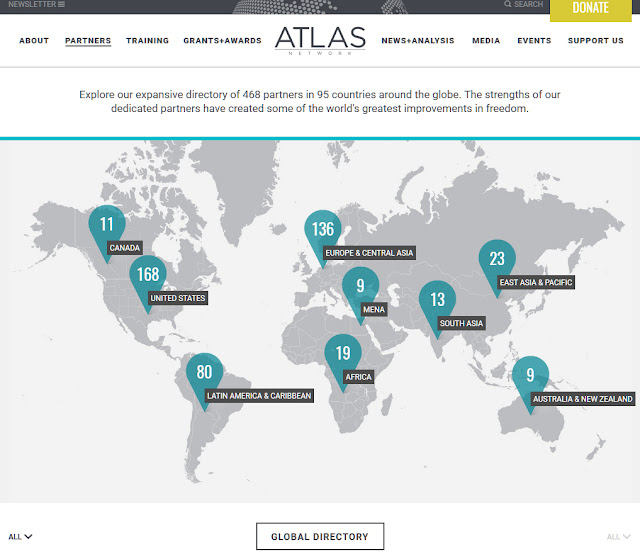
Neoliberals have successfully ended “trust-busting,” the regulation of, or breaking up of, large corporations that had controlled prices and prevented competition. This is brought back to America the "Gilded Age" within the technology industry creating a new class of the super-rich "captains of industry" or "robber barons" very similar to the late 19th Century.
They also succeeded in displacing the Progressive human rights message advocated by Eleanor Roosevelt and Democratic Presidents Lyndon Johnson and Jimmy Carter by eliminating or reducing the impact of fair trade and pro-worker laws and by minimizing the economic safety-net programs.
As the result, they restored late-19th Century income inequality in the United States. And they have done so by using the racial, ethnic, religious, and anti-science bigotry that has traditionally divided Americans since the 17th Century.
How did this happen???
Neoliberals: Four Men You Don't Know
The work of four men created the success of the Neoliberal movement.
It began as an international movement initiated by these two guys in 1938:
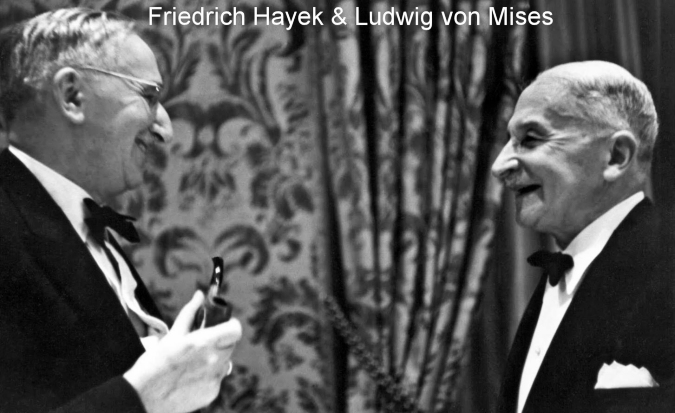
Friedrich Hayek and Ludwig von Mises are the Founding Fathers of the most successful ideological movement in the United States. Yet most Americans have no idea who they were and did not hear the term Neoliberal or Neoliberalism mentioned once on any news show on TV in the entire election year of 2016. Neocon maybe. But Neoliberal, no.
In 1938 in Paris, these two exiled Austrian Jews, Ludwig von Mises and Friedrich Hayek, discovered a shared belief that social democracy was a manifestation of a collectivism that occupied the same spectrum as nazism and communism, as exemplified by Franklin Roosevelt’s New Deal and the gradual development of Britain’s welfare state.
At that time they coined the term Neoliberalism as a label for their view. Thus Neoliberalism came into being.
Except that in 1938 it was a discussion between economic theorists in an academic setting. To avoid the Nazi's, Mises ended up in the United States and Hayek in Britain. WWII followed and their anti-government economic intervention views hardened.
In a 1944 book, The Road to Serfdom, Hayek argued that government planning, by crushing individualism, would lead inexorably to totalitarian control. In 1947 he, with Mises and others, founded in Switzerland the first organization to spread the doctrine of neoliberalism – the Mont Pelerin Society – supported by billionaires and their foundations. American billionaire Charles Koch, one of the famous or infamous (depending on your point of view) Koch brothers, is a long-standing member. But Koch's influence would become more significant later.
In 1945 another person most Americans have never heard of, wealthy Brit Antony Fisher, was alarmed by the election of a Labour government, the nationalisation of industry, and the introduction of central economic planning. He had read The Road to Serfdom which influenced his thinking. Fisher sought out Hayek at the London School of Economics where he taught and talked about his plans to go into politics. Hayek, however, convinced him that think-tanks were the best medium for effecting political change.
In 1955, taking Hayek's advice he used his fortune to set up the influential Institute of Economic Affairs. In 1971 Fisher founded the International Institute for Economic Research. In 1977 Fisher moved to San Francisco with his second wife Dorian (widow of George N. Crocker - yes, that is an important fact), who he had met through the Mont Pelerin Society, and founded the Pacific Research Institute in 1979. He also assisted in the development of the Centre for Independent Studies in Sydney.
In 1981, he created the Atlas Economic Research Foundation to provide a central institutional structure for what quickly became an ever-expanding number of international free-market think-tanks or research institutes using the gatherings of the Mont Pelerin Society to find personnel, fund-raisers and donors.
Atlas has been described as "self replicating, a think tank that creates think tank."
In addition to the Pacific Research Institute, California members of the Atlas Network include the Hoover Institution, the Ayn Rand Institute, the Benjamin Rush Institute, the California Policy Center, the Claremont Institute, the Independent Institute, Liberty International, the Pacific Legal Foundation, the Reason Foundation, Seasteading Institute, Smock Media, and Taliesin Nexus.
Which brings us to the United States, where Neoliberal wealthy corporate interests created a national network of academics, businessmen, journalists and activists who always hid under the traditional label "conservative." They funded academic positions and departments, particularly at the universities of Chicago and Virginia, plus a series of think tanks. The latter include among others The American Enterprise Institute, The Heritage Foundation, The Cato Institute (founded as the Charles Koch Foundation in 1974), the Pacific Research Institute, and The Heartland Institute. In 1992 they established a network of state-level think tanks across the United States called the State Policy Network (SPN) which while new ones are created and others disappear include (links to the websites of all of the following can be accessed from the SPN website):
- Alabama: Alabama Policy Institute
- Alaska: Alaska Policy Forum
- Arizona: Goldwater Institute
- Arkansas: Advance Arkansas Institute, Arkansas Policy Foundation
- California: See the 13 listed above.
- Colorado: Independence Institute
- Connecticut: Yankee Institute for Public Policy
- Delaware: Caesar Rodney Institute
- Florida: Foundation for Government Accountability, James Madison Institute, Friends of Universidad Francisco Marroquin, Foundation for Excellence in Education
- Georgia: Georgia Center for Opportunity, Georgia Public Policy Foundation
- Hawaii: Grassroot Institute
- Idaho: Idaho Freedom Foundation
- Illinois: Illinois Policy Institute, Heartland Institute, Institute for Truth in Accounting
- Indiana: Indiana Policy Review Foundation, EdChoice
- Iowa: Public Interest Institute
- Kansas: Kansas Policy Institute
- Kentucky: Bluegrass Institute for Public Policy Solutions
- Louisiana: Pelican Institute for Public Policy
- Maine: Maine Heritage Policy Center
- Maryland: Calvert Institute for Policy Research, Maryland Public Policy Institute
- Massachusetts: Pioneer Institute, Beacon Hill Institute
- Michigan: Mackinac Center for Public Policy, Docs4Patient Care Foundation, Acton Institute
- Minnesota: Center of the American Experiment, Freedom Foundation of Minnesota, Intellectual Takeout, Citizens’ Council for Health Freedom
- Mississippi: Empower Mississippi Foundation, Mississippi Center for Public Policy
- Missouri: Show-Me Institute
- Montana: Montana Policy Institute, Property & Environment Research Center
- Nebraska: Platte Institute for Economic Research
- Nevada: Nevada Policy Research Institute
- New Hampshire: Josiah Bartlett Center for Public Policy, Granite Institute
- New Mexico: Rio Grande Foundation
- New York: Empire Center for Public Policy, Manhattan Institute for Policy Research, Moving Picture Institute, National Review Institute
- North Carolina: John Locke Foundation, Civitas Institute, The James G. Martin Center for Academic Renewal, Jesse Helms Center
- Ohio: Buckeye Institute for Public Policy Solutions
- Oklahoma: Oklahoma Council of Public Affairs, EFoundation, Liberty Foundation of America
- Oregon: Cascade Policy Institute
- Pennsylvania: Commonwealth Foundation for Public Policy Alternatives, Free To Choose Network
- Rhode Island: Rhode Island Center for Freedom and Prosperity
- South Carolina Palmetto Promise Institute, South Carolina Policy Council, Center for Independent Employees, Ceterus
- South Dakota: Great Plains Public Policy Institute
- Tennessee: Beacon Center of Tennessee, Spark Freedom
- Texas: Texas Public Policy Foundation
- Utah: Libertas Institute, Sutherland Institute
- Vermont: Ethan Allen Institute
- Virginia: Thomas Jefferson Institute, Virginia Institute for Public Policy, Charles Koch Institute, Charles Koch Institute, Young America’s Foundation, Institute for Humane Studies, Institute for Justice, Franklin Center for Government and Public Integrity, Leadership Institute, Mercatus Center at George Mason University, DonorsTrust, National Legal and Policy Center, Center for Competitive Politics, National Right to Work Legal Defense Foundation, Association of American Educators Foundation, Americans for Prosperity Foundation, American Legislative Exchange Council
- Washington: Freedom Foundation, Washington Policy Center
- West Virginia: Cardinal Institute, Public Policy Foundation of West Virginia
- Wisconsin: MacIver Institute for Public Policy, Wisconsin Policy Research Institute, Wisconsin Institute for Law and Liberty
- Wyoming: Wyoming Liberty Group
Ironically, holding a high public office in the United States is Vice-President Mike Pence a somewhat well-known Neoliberal who served as President of the Indiana Policy Review Foundation (see list above). Pence eschews publicity as a Neoliberal because he understands that winning in the public policy arena has nothing to do with getting your face before the public.
There was, however, one unique exception to the "shun the limelight" rule created by the fourth person you never heard of, Lemuel Boulware. Boulware was a senior GE executive whose ideas have been called "Boulwarism." In a 1949 address at Harvard Boulware stated:
We have simply got to learn, and preach, and practice what’s the good alternative to socialism. And we have to interpret this to a majority of adults in a way that is understandable and credible and attractive.Ronald Reagan was hired by General Electric (GE) in 1954 to host the General Electric Theater, a weekly TV drama series and to give talks to over 200,000 GE employees as a motivational speaker. His speeches carried the Neoliberal re-education message.

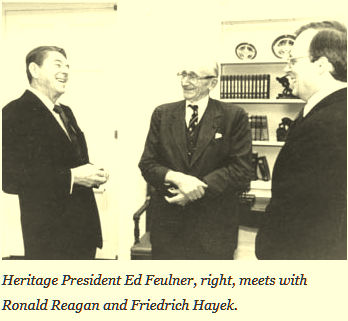 Had they heard Reagan say the quote above, for many Americans it would have been the first time they ever heard of Friedrich Hayek. Reagan, who was foolishly underestimated by Progressive Democrats, knew who Hayek was.
Had they heard Reagan say the quote above, for many Americans it would have been the first time they ever heard of Friedrich Hayek. Reagan, who was foolishly underestimated by Progressive Democrats, knew who Hayek was.In 1980 Republican Ronald Reagan had defeated America's last Progressive President Democrat Jimmy Carter to become America's first Neoliberal President. By that time Reagan was the America's most effective spokesperson for Neoliberalism using the alternative reality game.
Giving America it's first, and to date only, Neoliberal President was the accomplishment of Boulware. You can learn more about him at the Foundation for Economic Education website. The Foundation for Economic Education, founded in 1946, is the oldest free-market think tank in the United States. It has had common board members with the Atlas Network.
Reagan was, of course, Governor of California for eight years having beaten Governor Pat Brown who had successfully instituted tuition-free college education in California. Don't ever think that Progressive causes are automatic winners in the Progressive Pacific.
In any event, Friedrich Hayek, Ludwig von Mises, Sir Antony Fisher, and Lemuel Boulware were the four men responsible for the success of American Neoliberalism. But you knew those names well.
The informed American should know what the Neoliberal ideology is and how, over a period of 70 years beginning in 1947, dedicated, well-funded organizers, not particularly enamored with either political party, were able to utilize our political system to take control of most state government$ in the United States. And, at this time somewhat less effectively, they have control of the U.S. Congress, no less so of the U.S. Supreme Court, and are in a tense power struggle in the U.S. Executive Branch.
After their beginnings in 1947 it took American Neoliberals 70 years to solidify the map below, though as we explain it was a surprisingly short 33 years after 1947 when we elected an avowed admirer of Neoliberalism to the Presidency in 1980.
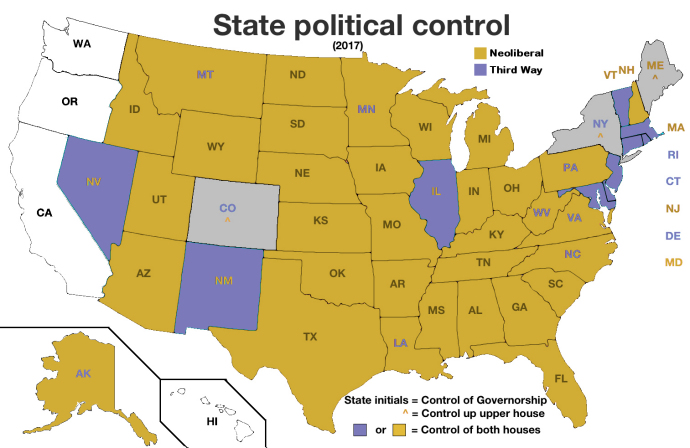
Progressives now must be willing to commit to a similar effort. That won't be easy.
As you might note, the map above does not use the terms "Republican" and "Democrat" but rather "Neoliberal" and "Third Way." The reason for this is simple. While American Neoliberals such as the Koch brothers have been able to gain an ideological dominance in the Republican party, they have also established an ideological beachhead in the Democratic Party.
In 1992 Democrat Bill Clinton was elected President ushering in the era of Third Way Democrats and ushering out of the Democratic Party power structure true Progressives. As explained in Wikipedia:
In politics, the Third Way is a position akin to centrism that tries to reconcile right-wing and left-wing politics by advocating a varying synthesis of right-wing economics and left-wing social policies. The Third Way was created as a serious re-evaluation of political policies within various centre-left progressive movements in response to international doubt regarding the economic viability of the state; economic interventionist policies that had previously been popularized by Keynesianism and contrasted with the corresponding rise of popularity for economic liberalism and the New Right.This was partly the result of the realization by some Democratic leaders that their party was losing ground because the core message of Progressivism is that "individual freedom is bound to one's personal responsibility to assure equitable communities."
..."Third Way" presidents "undermine the opposition by borrowing policies from it in an effort to seize the middle and with it to achieve political dominance."
...The Third Way think tank and the Democratic Leadership Council are adherents of Third Way politics.
Finally, we must address the related ironic problem of the successful attack on "intellectuals" having been expanded by American Neoliberals who, focused on their narrow goal of unleashing unfettered capitalism, set out to create a distrust of natural science and, particularly, to discredit the climate science advocated by Al Gore.
Science: "natural" versus "social"
As explained by Wikipedia (emphasis added):
Contemporary science is typically subdivided into the natural sciences which study the material world, the social sciences which study people and societies, and the formal sciences like mathematics. Disciplines which use science like engineering and medicine may also be considered to be applied sciences.As further explained in Wikipedia (emphasis added):
The history of the social sciences begins in the Age of Enlightenment after 1650, which saw a revolution within natural philosophy, changing the basic framework by which individuals understood what was "scientific". Social sciences came forth from the moral philosophy of the time and were influenced by the Age of Revolutions, such as the Industrial Revolution and the French Revolution. The social sciences developed from the sciences (experimental and applied), or the systematic knowledge-bases or prescriptive practices, relating to the social improvement of a group of interacting entities.Natural science doesn't reflect any "prescriptive practices." As explained in Wikipedia:
Natural science is a branch of science concerned with the description, prediction, and understanding of natural phenomena, based on empirical evidence from observation and experimentation. Mechanisms such as peer review and repeatability of findings are used to try to ensure the validity of scientific advances.Natural science can tell you what the likely outcome of a natural phenomenon such as Climate Change might be. But natural science would not claim to offer prescriptive practices for the natural improvement of a group of interactive entities. A particular scientist might do so, but natural science does not embrace some moral philosophy.
Natural science can be divided into two main branches: life science (or biological science) and physical science. Physical science is subdivided into branches, including physics, chemistry, astronomy and earth science. These branches of natural science may be further divided into more specialized branches (also known as fields).
In Western society's analytic tradition, the empirical sciences and especially natural sciences use tools from formal sciences, such as mathematics and logic, converting information about nature into measurements which can be explained as clear statements of the "laws of nature". The social sciences also use such methods, but rely more on qualitative research, so that they are sometimes called "soft science", whereas natural sciences, insofar as they emphasize quantifiable data produced, tested, and confirmed through the scientific method, are sometimes called "hard science"
With this understanding, we can then see the potential problem of the "intellectual." Per Wikipedia (emphasis added):
An intellectual is a person who engages in critical thinking, research, and reflection about society and proposes solutions for its normative problems.As further explained by Wikipedia:
Normative generally means relating to an evaluative standard. Normativity is the phenomenon in human societies of designating some actions or outcomes as good or desirable or permissible and others as bad or undesirable or impermissible.In other words, an "intellectual" is not a scientist, but rather a person who ponders - under the guise of engaging in the social sciences - matters related to politics, economics, religion, and philosophy, and then offers opinions supported by logic based upon observation of groups of people. In doing so, the "intellectual" uses preconceived values, opinions frequently offensive to many, regarding human beliefs, human behavior, government, and law.
In the case of Climate Change, Al Gore is a politician, not a natural scientist. The study of politics is a social science full of people offering "prescriptive practices, relating to the social improvement of a group of interacting entities." Not that natural scientists all lack political opinions.
But a question like
"would the world be better off after unrestrained human abetted climate change that results in the end of the human species"is a philosophical question to be addressed in the political arena. Natural science can have no opinion on that subject because "better off" is not a standard in natural science.
Perhaps that has not been made clear. Our history of politics oriented to conflating the validity of moral philosophy and religion with natural science has taken advantage of that to confuse natural-science-fact ("laws of nature") with prescriptive opinion.
This has successfully confused the true Progressive identity conflating Progressives with the meaningless term "intellectuals."
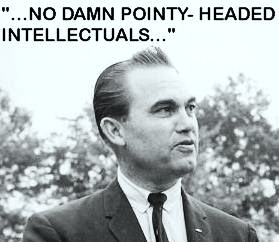 The late George Wallace, Alabama Governor and 1968 Presidential candidate pictured at the left, gained notoriety for tapping into an anti-intellectual bias that many politicians have used (though the quote shown is somewhat inaccurate as he said: "Pointy-head college professors who can't even park a bicycle straight ....").
The late George Wallace, Alabama Governor and 1968 Presidential candidate pictured at the left, gained notoriety for tapping into an anti-intellectual bias that many politicians have used (though the quote shown is somewhat inaccurate as he said: "Pointy-head college professors who can't even park a bicycle straight ....").That anti-intellectual bias, particularly when coupled with racial prejudice and/or class distrust, makes it is difficult to explain to far too many Americans the complex history that created the 21st Century United States. It is that history which resulted in a significant cultural divide between the Pacific States and the 33 Neoliberal controlled states shown on the map above.
The crisis is that the American "anti-intellectual class" bias based on perceived snobbery has been used by goal-oriented Neoliberals to deliberately create a political atmosphere that confuses "intellectuals" with "scientists" in natural science fields.
Again, we need to be clear on the fact that those scientists use "scientific method" as described by the Oxford Dictionaries Online as (emphasis added):
...A method or procedure that has characterized natural science since the 17th century, consisting in systematic observation, measurement, and experiment, and the formulation, testing, and modification of hypotheses.Unlike the social sciences, before a hypothesis in natural science can become published as fact, experimental and theoretical results must be reproduced by many others within the scientific community - an arduous process referred to as "peer review".
Social "science" has not retained that approach. Statistical studies are the core of the social sciences when the "social scientist" attempts to prove a hypothesis. But instead of the arduous process of peer review prior to publication, the conclusions of literally thousands of social science statistical studies appear in the popular press as support for some assumed arguable truth.
This has allowed intellectuals to insult the beliefs of thousands of voters. Thus, it became "clear" to many Americans that all scientists are in the business of offending people, a truth then used to undermine natural science when it serves a political purpose.
In truth, both Neoliberalism and Third Way Liberalism are the result of the pondering of intellectuals, using data from the social sciences - sociology, economics, political science - to support normative views. The weakness of Third Way Liberalism is that historically Liberals have been more transparent in their activities, more thinly spread while advocating for numerous disparate goals, and unfortunately focused on national politics rather than on state and local government.
Neoliberals retain a late 18th Century view of these United States - that the states are empowered to govern and at the beginning they allocated only very limited powers to the new national government. In fact, this is a correct take on the Constitution as it was viewed not by "the Founding Fathers" but by the vast majority of state politicians who voted to ratify it, and by their constituents.
To win control of the state governments, American Neoliberals have abandoned all conscience, piggy-backing on the appeal of the anti-intellectual bias, plus racial bigotry, religious dogmatism, and class prejudice, in order to create that map above, solely to achieve their narrow goal of unleashing unfettered capitalism. They have accomplished this despite the fact that they are well-educated intellectuals (economic philosophers).
This narrative on American Neoliberal activity is offered to help Progressives focus on winning elections at the local and state levels over the next 30 years. But to accomplish that, Progressives need to create their own future narrative for the 21st Century.
Whether to interface with the existing political parties or bypass them will be one of the first decisions. The fact is that outside the Progressive Pacific states true Progressives do not dominate the Democratic Party across America at any level.

